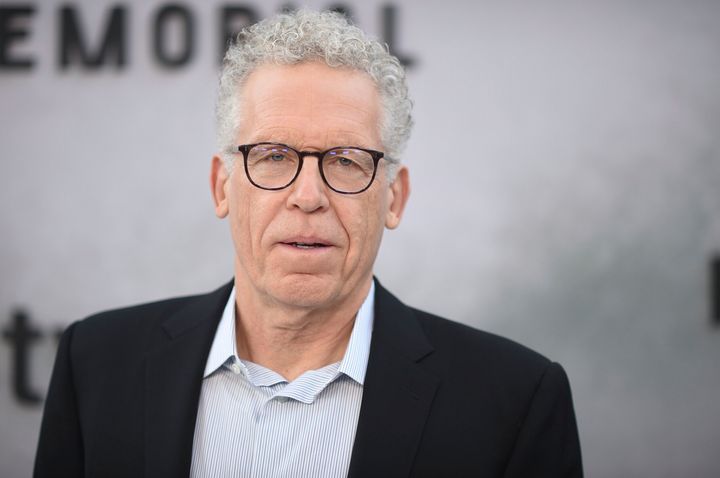
“Lost” co-creator Damon Lindelof admitted he failed to stop a racist work environment on the popular ABC show.
“I have no recollection of those specific things,” Lindelof told author Maureen Ryan for her book, “Burn it Down: Power, Complicity, and a Call for Change in Hollywood,” an excerpt of which was published Tuesday in Vanity Fair.
“I’m just saying that it’s literally baffling my brain — that they did happen and that I bore witness to them or that I said them,” he continued. “To think that they came out of my mouth or the mouths of people that I still consider friends is just not computing.”
Ryan, HuffPost’s former TV critic, spoke to actors and writers, half of them people of color, across the show’s six seasons.
Monica Owusu-Breen, who wrote for the third season, likened her time to fraternity-like pain.
“I can only describe it as hazing,” she said. “It was very much middle school and relentlessly cruel. And I’ve never heard that much racist commentary in one room in my career.”
“Lost” premiered in 2004 and made ABC a destination for six years. Its hook of a plane crashing on a deserted island quickly gave way to the discovery that the surviving passengers weren’t alone — and a nesting doll of questions.
“Romeo + Juliet” star Harold Perrineau was fresh off two “Matrix” films when he signed on to play Michael, the father of a young Black kid named Walt. He said he was promised a meaty part, only to be told that the white characters were “relatable” and that he “wasn’t as important.”

Jordan Strauss/Invision/Associated Press
“Obviously there was a disproportionate amount of focus on Jack and Kate and Locke and Sawyer — the white characters,” Lindelof told Ryan. “Harold was completely and totally right to point that out. It’s one of the things that I’ve had deep and profound regrets about.”
Perrineau said he noticed that new scripts saw Michael, whose son was abducted by a group of nefarious “Others,” never mentioned Walt again — and told his bosses he had no interest in furthering “the narrative that nobody cares about Black boys, even Black fathers.”
When he convinced Lindelof and co-creator Carlton Cuse to flesh out the relationship, Perrineau said he was given two “14-hour, 18-hour days” to shoot them — unlike the numerous days white actors like Josh Holloway were provided for their scenes.
“Any time you mention race, everybody gets — their hair gets on fire, and they’re like, ‘I’m not racist!’” Perrineau said. “It’s like, ’Nope. Because I say that I’m Black doesn’t mean I’m calling you a racist. I am talking to you from my perspective … So can we just do that?”
The writers were struggling with incorporating the growth spurt of the actor who played Walt. Perrineau, who said he was promised substantial screen time, was eventually written out alongside Walt — a few days before filming the Season 2 finale.

Richard Shotwell/Invision/Associated Press
“It became pretty clear that I was the Black guy. Daniel was the Asian guy,” Perrineau said of co-star Daniel Dae Kim. “And then you had Jack and Kate and Sawyer.”
Perrineau said the pay structure also was unfair, as he found himself in a lower salary tier than his white co-stars.
Owusu-Breen, who wrote for the third season and said she regularly witnessed racist jokes in the writers room, told Ryan she was “happy to be fired” after suggesting that Mr. Eko, who was played by Adewale Akinnuoye-Agbaje, not be killed in a lynching.
“Carlton said something to the effect of, ‘I want to hang him from the highest tree. God, if we could only cut his dick off and shove it down his throat,’” she recalled. “At which point I said, ‘You may want to temper the lynching imagery …’ And I was very clearly angry.”
Owusu-Breen continued: “All I wanted to do was write some really cool episodes of a cool show. That was an impossibility on that staff. There was no way to navigate that situation. Part of it was they really didn’t like their characters of color.”
Writer-producer Hsu Taylor, who worked on the last two seasons, said Cuse scolded her for speaking to a director. She also said she wrote the acclaimed “Ab Aeterno” episode, only for Cuse to take credit and be told to buy him “a little present.”
“It’s deeply unsettling to know that there were people who had such bad experiences,” Cuse said. “I did not know people were feeling that way. No one ever complained to me, nor am I aware that anybody complained to ABC Studios. I wish I had known.”
Cuse said the notion that he had staffers buy him gifts was “absurd.”
